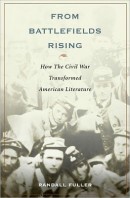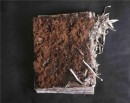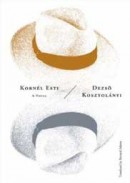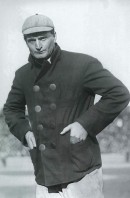 Christopher Hitchens writes both movingly and caustically about Philip Larkin’s long-running relationship with Monica Jones: “[Larkin] once described the sexual act as a futile attempt to get ‘someone else to blow your own nose for you.’ These collected letters reflect his contribution to a distraught and barren four-decade relationship with Monica Jones, an evidently insufferable yet gifted woman who was a constant friend and intermittent partner (one can barely rise to saying mistress, let alone lover) until Larkin’s death in 1985.” . . . And Martin Amis writes an appreciation of his friend Hitchens that reads disconcertingly (if understandably) like an advance eulogy. . . . Christian Lorentzen cheekily considers Martin Amis’ impending move to Brooklyn, and the saturation of writers already there. (”They’re like bedbugs with bylines, and there’ll soon be a new bug in town, who might just be the biggest bug of all.”) . . . Here’s the type of contest that doesn’t come along every day: “Design the Polish edition of your favorite book.” . . . I haven’t even listened to this myself yet, but how could it not be worth sharing? Werner Herzog and Cormac McCarthy on the same panel about the connections between science and art. I only thought those two would ever join forces to announce the apocalypse on national television. . . . Robert Lane Greene writes about his role as his office’s unofficial language nerd: “When someone asks me, ‘Is such-and-such a verb?’ My answer is usually, ‘Well, a lot of people are using it as one, including in professionally edited writing, so yes.’ Still nervous, they might ask, ‘But is it in the dictionary?’ The answer is probably ‘not yet,’ but that doesn’t mean much.” . . . Ian McEwan talks to The Browser about the books that have “helped shape” his own.
Christopher Hitchens writes both movingly and caustically about Philip Larkin’s long-running relationship with Monica Jones: “[Larkin] once described the sexual act as a futile attempt to get ‘someone else to blow your own nose for you.’ These collected letters reflect his contribution to a distraught and barren four-decade relationship with Monica Jones, an evidently insufferable yet gifted woman who was a constant friend and intermittent partner (one can barely rise to saying mistress, let alone lover) until Larkin’s death in 1985.” . . . And Martin Amis writes an appreciation of his friend Hitchens that reads disconcertingly (if understandably) like an advance eulogy. . . . Christian Lorentzen cheekily considers Martin Amis’ impending move to Brooklyn, and the saturation of writers already there. (”They’re like bedbugs with bylines, and there’ll soon be a new bug in town, who might just be the biggest bug of all.”) . . . Here’s the type of contest that doesn’t come along every day: “Design the Polish edition of your favorite book.” . . . I haven’t even listened to this myself yet, but how could it not be worth sharing? Werner Herzog and Cormac McCarthy on the same panel about the connections between science and art. I only thought those two would ever join forces to announce the apocalypse on national television. . . . Robert Lane Greene writes about his role as his office’s unofficial language nerd: “When someone asks me, ‘Is such-and-such a verb?’ My answer is usually, ‘Well, a lot of people are using it as one, including in professionally edited writing, so yes.’ Still nervous, they might ask, ‘But is it in the dictionary?’ The answer is probably ‘not yet,’ but that doesn’t mean much.” . . . Ian McEwan talks to The Browser about the books that have “helped shape” his own.
Archives, April, 2011
Thursday, April 28th, 2011
In the Ether
Tuesday, April 26th, 2011
Icebreaker
The opening line of Hard Rain Falling by Don Carpenter:
Three Indians were standing out in front of the post office that hot summer morning when the motorcycle blazed down Walnut Street and caused Mel Weatherwax to back his pickup truck over the cowboy who was loading sacks of lime.
Tuesday, April 26th, 2011
The Beat
A weekly roundup of noteworthy reviews from other sources.
 Craig Fehrman reviews Randall Fuller’s examination of the Civil War’s influence on American literature. Fehrman notes that the lack of lasting contemporary literature about the war — “In fact, the work most people think of is The Red Badge of Courage — a novel published 30 years after the war’s end by a writer who wasn’t even born until 1871.” — but says Fuller carefully makes the case for the war’s effect on the writing and mindset of Melville, Whitman, Emerson, and others. . . . I have no idea what I would think of it now, but I read Tim Sandlin’s Skipped Parts eons ago and got a big kick out of it. Mike Peed reviews Lydia, Sandlin’s fourth book following those same characters: “Sandlin doesn’t specialize in subtlety. In large part, he relates his story via megaphone, with loud plot turns and louder wisecracks. ‘Life is a Saturday-morning cartoon meant to entertain a God who tends to sleep late’ is a typical one-line digression. But although the novel masquerades as jeremiad, it’s ultimately uplifting, adroitly chronicling the ways we seek to transcend our fears.” . . . Laura Bennett reviews the ubiquitous Tina Fey’s memoir: “Neurosis makes Bossypants funny (and it is very funny), but it is fueled by reflexive self-deprecation instead of real reflection.” . . . Laird Hunt reviews a novel about a writer who commits suicide that can only be read in a “troubling light,” as the real-life author took his own life just days after finishing the book. . . . Michael S. Roth reviews a book — inflated from a widely discussed magazine article — by an anonymous adjunct professor who bemoans the state of today’s college students. . . . Adam Mars-Jones reviews David Lodge’s half-novel/half-biography of H.G. Wells: “The benefit of this hybrid form for the writer is that it frees up the texture of the book, avoiding the build-up of clogging documentation, and allows him to hurry over or emphasize themes at will. The benefit for the reader isn’t so clear.”
Craig Fehrman reviews Randall Fuller’s examination of the Civil War’s influence on American literature. Fehrman notes that the lack of lasting contemporary literature about the war — “In fact, the work most people think of is The Red Badge of Courage — a novel published 30 years after the war’s end by a writer who wasn’t even born until 1871.” — but says Fuller carefully makes the case for the war’s effect on the writing and mindset of Melville, Whitman, Emerson, and others. . . . I have no idea what I would think of it now, but I read Tim Sandlin’s Skipped Parts eons ago and got a big kick out of it. Mike Peed reviews Lydia, Sandlin’s fourth book following those same characters: “Sandlin doesn’t specialize in subtlety. In large part, he relates his story via megaphone, with loud plot turns and louder wisecracks. ‘Life is a Saturday-morning cartoon meant to entertain a God who tends to sleep late’ is a typical one-line digression. But although the novel masquerades as jeremiad, it’s ultimately uplifting, adroitly chronicling the ways we seek to transcend our fears.” . . . Laura Bennett reviews the ubiquitous Tina Fey’s memoir: “Neurosis makes Bossypants funny (and it is very funny), but it is fueled by reflexive self-deprecation instead of real reflection.” . . . Laird Hunt reviews a novel about a writer who commits suicide that can only be read in a “troubling light,” as the real-life author took his own life just days after finishing the book. . . . Michael S. Roth reviews a book — inflated from a widely discussed magazine article — by an anonymous adjunct professor who bemoans the state of today’s college students. . . . Adam Mars-Jones reviews David Lodge’s half-novel/half-biography of H.G. Wells: “The benefit of this hybrid form for the writer is that it frees up the texture of the book, avoiding the build-up of clogging documentation, and allows him to hurry over or emphasize themes at will. The benefit for the reader isn’t so clear.”
Friday, April 22nd, 2011
An Instant (Penguin) Classic?
 Morrissey, former lead singer of The Smiths and now longtime solo act, is finishing up his autobiography:
Morrissey, former lead singer of The Smiths and now longtime solo act, is finishing up his autobiography:
The much-anticipated Mozography is almost three years in the making, and the singer hopes to publish the tome in 2012. “I’ve reached the re-drafting, trimming stage,” he said. But despite reams of material — 200,000 words, according to interviewer John Wilson — Morrissey has yet to find, or choose, a publisher. Last year, an editor at Faber said it would be “the fulfillment of my most pressing and persistent publishing dream” if Morrissey brought his “much-rumored memoir to the House of Eliot.” This week, the 51-year-old quipped that he wants to see the book immediately published as a Penguin Classic.
Wednesday, April 20th, 2011
“(Do mountains count as books?)”
 The Los Angeles Review of Books is a web-based literary enterprise that is scheduled to fully launch later this year. For now, the site — led editorially by Tom Lutz, as well as Evan Kindley, Julie Cline, and Matthew Specktor, among others — is up and operating as a “preview review.” The LARB calls itself “the first major, full-service book review to launch in the 21st century.” Full service? With a boast like that, they better be ready to fill it up with regular unleaded.
The Los Angeles Review of Books is a web-based literary enterprise that is scheduled to fully launch later this year. For now, the site — led editorially by Tom Lutz, as well as Evan Kindley, Julie Cline, and Matthew Specktor, among others — is up and operating as a “preview review.” The LARB calls itself “the first major, full-service book review to launch in the 21st century.” Full service? With a boast like that, they better be ready to fill it up with regular unleaded.
I wish them the best of luck. With their list of contributing editors (which is longer than some short stories), they should have a lot to offer. (The site currently features a considerable list of forthcoming articles.)
One of the first three pieces up on the site is Ben Ehrenreich’s “The Death of the Book,” a smart and playful essay about a concern that has existed as long as the book. Or longer. Here’s a piece:
For the record, my own loyalties are uncomplicated. I adore few humans more than I love books. I make no promises, but I do not expect to purchase a Kindle or a Nook or any of their offspring. I hope to keep bringing home bound paper books until my shelves snap from their weight, until there is no room in my apartment for a bed or a couch or another human being, until the floorboards collapse and my eyes blur to dim. But the book, bless it, is not a simple thing.
Nor, as we know it, is it particularly venerable. All of our words for book refer, at root, to forms no longer recognizable as such: biblos being the Greek word for the pith of the papyrus stalk (on which texts in the Greco-Roman world were inscribed); libri being Latin for the inner bark of a tree, just as the Old English bóc and Old Norse bók referred to the beech tree. Likewise “tome” is from a Greek word for a cutting (of papyrus) and “volume” is from the Latin for a rolled-up thing — a scroll, which is the form most texts took until they were replaced by folded parchment codices. Prior to the late 13th century, when paper was first brought to Europe from China, the great works of Western civilization were recorded on the skins of animals. The Inca wrote by knotting strings. The ancient Chinese scrawled calligraphy on cliffs. (Do mountains count as books?) The printed, paper book, as we know it, dates only to the mid-fifteenth century, but those early Gutenberg exemplars were hardly something you’d curl up with on a rainy Sunday afternoon. The book as an affordable object of mass production — as something directly kin to the books that line our shelves — was not born until the 19th century, just in time for the early announcements of its death.
Friday, April 15th, 2011
The Opposite of Federer
Speaking of Geoff Dyer, he has a brief essay up at Prospect Magazine about his “literary allergy” to David Foster Wallace. On the one hand, I’m a Wallace fan. On the other, there are plenty of sacred literary cows to whom I’m immune, and I would hate for criticism of beloved writers to disappear. Moving away from hands altogether, it’s also true that though I’m a fan, there are things about Wallace’s work — perhaps especially his fiction — that bother me. Dyer writes, “I react against the variously contrived sloppinesses of all those ’sort ofs’ and ‘kind ofs’ in tandem with, sometimes followed by, the magisterial flamboyant (’Existentiovoyeuristic conundra notwithstanding’).” I agree about the contrived sloppiness, for various reasons, but mostly because of the “contrived” part. And this is more a matter of taste than anything else (there must be some people who prefer Rafael Nadal’s human twitches and strains to Roger Federer’s robotic efficiency), but Dyer offers a smart metaphor for Wallace’s style, given Wallace’s writing about tennis, and about Federer in particular:
Federer’s style is about maximum economy and grace of action. Between games he just sits there. Barely even sweats. DFW, by contrast, is forever picking his shorts out of his arse like Nadal, bouncing the balls as many times as Djokovic, tugging his cap forwards and backwards like Roddick, or twitching like Lleyton Hewitt. He is the least Federer-like writer imaginable.
Friday, April 15th, 2011
The (Non)Anxiety of (American) Influence
 In what is my best decision of 2011 so far, I’m on a Geoff Dyer kick. Having meant to read him for a pretty long time, I recently finished Yoga for People Who Can’t Be Bothered to Do It
In what is my best decision of 2011 so far, I’m on a Geoff Dyer kick. Having meant to read him for a pretty long time, I recently finished Yoga for People Who Can’t Be Bothered to Do It. Last night I bought the new collection of his essays and reviews, Otherwise Known as the Human Condition
, which I dipped into briefly, and Out of Sheer Rage
, his book about not writing a book about D. H. Lawrence, the work that probably did the most to cement his reputation as both a brilliant, hilarious writer and an impossible-to-categorize follower of whims and neuroses. I’m 50 pages in and loving it.
Dyer was recently interviewed at The Rumpus, where this exchange, among others, took place:
Rumpus: British writers often come across as biased against their American counterparts, as though they still think of us as their dumb younger brothers to be laughed at and maybe sometimes condescendingly patted on the head. You, though, seem to have a great interest in and respect for American literature. What is it about American literature that attracts you and why?
Dyer: I actually disagree completely with the premise of this question. I think many British readers and writers have found American writing to be way more inspiring than British literature. I think it’s to do with the voice, that lovely demotic richness of American English. And there seems a greater freedom in U.S. fiction to just go with the voice, to roll with it. People tend not to do that in Britain so much unless it’s a very obviously ― and often history-driven ― kind of ventriloquism. The great exception of course is Martin Amis, which is why we are so in thrall to him. But, you know, it’s not just American writing; I love America and, in so far as one can generalize, Americans.
I sent that excerpt to a friend, and she wrote back about the U.S. and the UK, “Each of us wants what the other has!”
Thursday, April 14th, 2011
“Oh, wow. What happened to yesterday?”
I embedded this video last summer, but I see no reason not to embed it again. In fact, you’re lucky I don’t repost it every day. I’ve just put on the Backlist a review of Dock Ellis in the Country of Baseball by poet Donald Hall. Ellis was a pitcher in the 1970s who once threw a no-hitter while still feeling some effects of an LSD trip. After he retired from baseball, he spent quite a bit of time counseling about the dangers of drugs, and he died in 2008 after suffering from cirrhosis due to alcoholism. Not long before he died, he gave an interview, part of which was brilliantly animated by James Blagden and turned into the video below. Enjoy:
Monday, April 11th, 2011
The Beat
A weekly roundup of noteworthy reviews from other sources.
 Jessa Crispin writes a piece both charming and levelheaded about Brian Greene, alternative universes, Henry James, and Kornél Esti, a novel by Dezsö Kosztolányi: “If one has to choose between believing in infinite choice and fate, fate seems like the sanest option. Apologies to Brian Greene and all of the scientists throughout time.” . . . John Stokes reviews two volumes of the collected letters of Ellen Terry, an English stage actress who lived from 1847 to 1928. I know next to nothing about Terry, but want to know more after reading Stokes’ essay, which is also sharp about letter-writing in general. . . . Anita Desai on a new biography of Gandhi: “Even in his lifetime the legend of Mahatma Gandhi had grown to such proportions that the man himself can be said to have disappeared as if into a dust storm. Joseph Lelyveld’s new biography sets out to find him.” . . . David L. Ulin says Jim Shepard deserves more readers, and that his new collection of stories “balances an understanding of history with a recognition that we may be living at the end of history, at a place where narrative can go only so far.” . . . Bruce Weber reviews a book that debunks myths about baseball’s origins that have already been debunked but also paints a vivid picture of the game’s earliest days.
Jessa Crispin writes a piece both charming and levelheaded about Brian Greene, alternative universes, Henry James, and Kornél Esti, a novel by Dezsö Kosztolányi: “If one has to choose between believing in infinite choice and fate, fate seems like the sanest option. Apologies to Brian Greene and all of the scientists throughout time.” . . . John Stokes reviews two volumes of the collected letters of Ellen Terry, an English stage actress who lived from 1847 to 1928. I know next to nothing about Terry, but want to know more after reading Stokes’ essay, which is also sharp about letter-writing in general. . . . Anita Desai on a new biography of Gandhi: “Even in his lifetime the legend of Mahatma Gandhi had grown to such proportions that the man himself can be said to have disappeared as if into a dust storm. Joseph Lelyveld’s new biography sets out to find him.” . . . David L. Ulin says Jim Shepard deserves more readers, and that his new collection of stories “balances an understanding of history with a recognition that we may be living at the end of history, at a place where narrative can go only so far.” . . . Bruce Weber reviews a book that debunks myths about baseball’s origins that have already been debunked but also paints a vivid picture of the game’s earliest days.
Friday, April 8th, 2011
A Selection
From My Life as a Fan by Wilfrid Sheed:
That winter, I turned twelve, which means I was just about fully developed as a fan. We mature early as a breed, somewhere between lyric poets, who I understood from my reading to be elderly gentlemen of eighteen or so, and chess players, who apparently hit their stride around four. Recently I chanced to reread an article on Ted Williams written by young Cleveland Armory in 1942, and was shocked to find myself reacting to it in exactly the same way as I had then, without any adult ironies or overtones or voices murmuring “Can’t you see the writer is really saying this?” or “It’s obvious that Williams was just a case of [name your favorite neurosis]”: it was as if I had put the piece down the day before and face value was still quite good enough for me.
So what had gone wrong? Had I failed to grow up at all since then, or was I grown up already in that one respect? The answer in the case of Williams may simply be that in 1942 it was just a case of one twelve-year-old reading about another and life wasn’t going to teach me a hell of a lot more about being twelve than I already knew. And this may be true of other superstars too whose inner resources have been entirely diverted into physical expression, like streams rushing into a great river. (“Did Fred Astaire ever say anything interesting?” says a friend. “Only every time he danced,” say I.)
Friday, April 8th, 2011
The Best Baseball Books
 I was hoping to have a baseball-related Backlist piece up today, but it will have to wait for Monday. In the meantime, I came across David L. Ulin’s list of his nine best baseball books. It’s a good list, and one that Ulin admits couldn’t possibly be comprehensive. It includes The Natural, Roger Angell, Jimmy Breslin, and Ring Lardner, among others. It also includes a book I hadn’t heard of, The Celebrant
I was hoping to have a baseball-related Backlist piece up today, but it will have to wait for Monday. In the meantime, I came across David L. Ulin’s list of his nine best baseball books. It’s a good list, and one that Ulin admits couldn’t possibly be comprehensive. It includes The Natural, Roger Angell, Jimmy Breslin, and Ring Lardner, among others. It also includes a book I hadn’t heard of, The Celebrant by Eric Rolfe Greenberg:
Greenberg’s only novel is a historical pastiche about a young Jewish immigrant in turn-of-the-20th-century New York and his devotion to Giants pitcher Christy Mathewson, a dedication that borders on the religious, framing fanhood as an act of faith.
Mathewson plays a role in a highly entertaining book I read a couple of years ago, Crazy ‘08: How a Cast of Cranks, Rogues, Boneheads, and Magnates Created the Greatest Year in Baseball History by Cait Murphy, which didn’t make Ulin’s list. It includes this memorable paragraph (which I’ve shared before on the blog) about pitcher Rube Waddell (pictured above):
In 1903, Waddell had a good season; once he finally bothered to show up in June, he won twenty-one games and led the league in strikeouts (with 302). It was a busy year in other ways, too: he also starred on vaudeville; led a marching band through Jacksonville; got engaged, married, and separated; rescued a log from drowning (he thought it was a woman); accidentally shot a friend; and was bitten by a lion. . . . Among his more respectable hobbies were chasing fires (he adored fire engines) and wrestling alligators; he once taught geese to skip rope. Hughie Jennings, manager of the Tigers, used to try to distract him from the sidelines by waving children’s toys.
The only book Ulin doesn’t include that I can’t imagine leaving off a list of the best baseball books is The New Bill James Historical Baseball Abstract.
Wednesday, April 6th, 2011
“It’s both embarrassing and hilarious to remember it now.”
 At The Paris Review, Thessaly La Force interviews Sigrid Nunez about her short new book, which covers her relationship with Susan Sontag and Sontag’s son, David Rieff. Nunez dated Rieff, and lived with him and Sontag, in the late 1970s.
At The Paris Review, Thessaly La Force interviews Sigrid Nunez about her short new book, which covers her relationship with Susan Sontag and Sontag’s son, David Rieff. Nunez dated Rieff, and lived with him and Sontag, in the late 1970s.
You talk about how your writing changed after you had this experience with Susan. I was really taken by those passages where you describe her giving you changes and advice on your fiction and you don’t accept it.
I hadn’t published anything yet. I was trying to write, but nothing was really working out. And the whole time I was living with Susan and David, I wasn’t able to write. But because she kept pushing me, I did finally show her a story I’d written. She was generous in her comments and she encouraged me to think I was someone who could become a writer. But for the most part, whenever she tried to criticize my work, I didn’t take it well.
Unfortunately, I was like a lot of my own students, who don’t really want criticism, just encouragement. It’s both embarrassing and hilarious to remember it now. You don’t sit there at 25, unpublished, inexperienced, and respond to Susan Sontag’s editorial suggestions like a little snot, rejecting every one of them. But it had a lot to do with the fact that I didn’t admire Susan’s own fiction. I’d read her first two novels and some of her stories, and I didn’t admire them the way I admired the essays. So when she tried to talk to me about language and style, I didn’t really trust what she said. Anyway, she was offended, of course, and she didn’t forget either. Years later, she’d ask me to send her my work and when I did she refused to say anything about it.
Wednesday, April 6th, 2011
Privileged Communications
Maria Bustillos published a long must-read at The Awl yesterday. It’s about the David Foster Wallace archives at the University of Texas, and what they say about his relationship to self-help and to his mother. Read the whole thing. Here’s a taste:
Wallace committed suicide in 2008. There has been a natural reluctance to broach questions surrounding the tragedy with his family and friends, just as there was reluctance to ask him directly about his personal history when he was alive. But there are indications—particularly in the markings of his books—of Wallace’s own ideas about the sources of his depression, some of which seem as though they ought to be the privileged communications of a priest or a psychiatrist. But these things are in a public archive and are therefore going to be discussed and so I will tell you about them.
One surprise was the number of popular self-help books in the collection, and the care and attention with which he read and reread them. I mean stuff of the best-sellingest, Oprah-level cheesiness and la-la reputation was to be found in Wallace’s library. Along with all the Wittgenstein, Husserl and Borges, he read John Bradshaw, Willard Beecher, Neil Fiore, Andrew Weil, M. Scott Peck and Alice Miller. Carefully.
Monday, April 4th, 2011
Sullivan on The Pale King
David Foster Wallace’s The Pale King is on its way to me in the mail, and I hope to review it here before too long. (Famous words, I know.) In the meantime, an acquaintance and one of my favorite writers, John Jeremiah Sullivan, has written about Wallace and his posthumous novel over at GQ. A piece:
It’s easy to make the book sound heavy, but it’s often very funny, and not politely funny, either. We meet the excruciatingly upbeat Leonard Stecyk, his “smile so wide it almost looked like it hurt,” a version of whom each of us knows or to some extent is. As a child he was such a do-gooder, everyone who met him instantly loathed him. [. . .]
Unhappily, it’s with this aspect of the book — the back-and-forth between recent past (at the IRS center) and deeper past (the characters’ formative years) — that we come to know what the publisher means about “unfinished.” The patterning isn’t right. It’s hardly even present. Wallace was struggling to compose the themes of these lives in a symphonic way, but he didn’t get there or, it has to be said, anywhere near.
And yet even in its broken state, The Pale King contains what’s sure to be some of the finest fiction of the year. It’s intimidating to have to describe the excellence of some of these set pieces . . .
Monday, April 4th, 2011
Barnburner Final Ends in 9-8 Vote
They say in a democracy, any one vote could make the difference. In a democracy the size of ours, this is almost inherently not true. But in a group of 17 people, it’s going to be true quite often. This year’s Tournament of Books came down to Jonathan Franzen’s Freedom and Jennifer Egan’s A Visit from the Goon Squad. The winner carried the day by a vote of 9-8. Whether my decision was one of the nine that could claim to be the difference-maker, you’ll have to head over there to see. But here is my decision, at the 75-word length that was requested:
Egan’s refracted structure seems only half-necessary, and I’m not sure that in 2011 it’s as innovative as it’s gotten credit for. The last, dystopian-ish chapter bothered me. Still, she writes some fine sentences, and I even bought the PowerPoint chapter, which shocked me. As for Franzen, I’m in the “honestly befuddled” camp. It would take me 4,000 words to fairly explain why. I can’t imagine revisiting a single paragraph in Freedom. My vote: Goon.
All the talk of Franzen in the tournament has inspired me to get back to work on those 4,000 (or more) words. I hope to have my extended thoughts about Freedom — and what could the world possibly need more at this point than those thoughts? — up on the site sometime by the end of April.
I was really happy to take part in this year’s ToB over at The Morning News. Many thanks to Rosecrans Baldwin and Andrew Womack, the site’s proprietors, for asking me. The ToB is always a good time, and I think there are two elements that make it even more than that: Pitting books against each other is a good idea. Yes, of course the decisions are arbitrary. And yes, sometimes, as in my first-round matchup of Next vs. Nox, the books are so different that the competition angle seems even sillier. But having to judge books against one another often makes for more dynamic reviewing than the more straightforward book-report tone adopted by many current-day reviews.
The second element that makes the ToB so great is the running commentary by Kevin Guilfoile and John Warner, who opine on each judge’s decision (and the tournament’s general progress) as soon as each round goes up. They’re the event’s esteemed Statler and Waldorf, or, as one commenter on the final round has already put it, “the bass line that makes the song work.”

